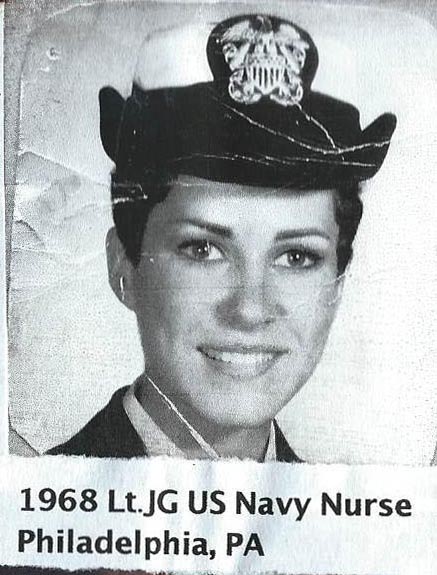 Download PDF of this full issue: v46n2.pdf (24.9 MB) Download PDF of this full issue: v46n2.pdf (24.9 MB) |
A Veteran's Lamentation
By Susan Frey
[Printer-Friendly Version] The year is 1968. Following employment in an Intensive Care Unit (ICU) of a large urban hospital, I seek a commission in the United States Navy Nurse Corps to cultivate nursing skills in triage medicine where a war zone offers the perfect milieu. This is at the apex of the Vietnam War. Under naval regulations at the time, nurses were required state-side duty prior to overseas deployment to hospital ships (my intention), so I faced initial triage experience in the ICU of Philadelphia Naval Hospital, the amputation center of the northeast corridor.

|
Philly hospital was a pit — a dilapidated campus on the harbor where the rats were as large as raccoons, where buildings jerry-rigged and connected by wheelchair ramps accommodated the 1600 combat veterans, primarily multiple amputees and otherwise mangled, angry men, riddled with shrapnel coursing through their young bodies and in the throes of Post-Traumatic Stress Syndrome, not yet understood or treatable. The in-country pain management and marijuana use incubated a fulminating environment of addiction. Adding insult to injury, race riots permeated the Philadelphia neighborhood.
One of my first patients was a quasi-celebrity for the times: Lt. Lewis Puller was the son of "Chesty" Puller, the highest decorated marine Commandant in the corps' history. Lew, newly wed prior to shipping out, returned as a triple amputee with abdominal eviceration, multiple organ failure and imbedded drug addiction. For six months strapped to a rotating Stryker Frame in an isolation unit, we irrigated and dressed his wounds, wrapped his stumps, fed him by hyperalimentation, flipped him hourly to prevent bed sores, re-booted him from cardiac arrest and medicated him for intractable pain, assuring a sustained addiction. Lew eventually left the unit for ward care and extensive rehabilitation in his home state of Virginia.
Despite irrevocable pain and addictions he finished law school, ran for congress, authored a Pulitzer Prize-winning autobiography, remained married to his high school sweetheart, beget two children and committed suicide by shotgun at the Vietnam Memorial Wall in 1993.
The unpopular Vietnam War was nasty enough but returning veterans also suffered the vilification of the naive public. Lew's personal cost was immeasurable — mine was twofold: I abandoned the nursing profession and any patriotic fervor I may have once held dear.
Susan Frey, PhD. ND, peace activist and lifetime member of VVAW retired to Gloucester, Massachusetts in 2003.
|



